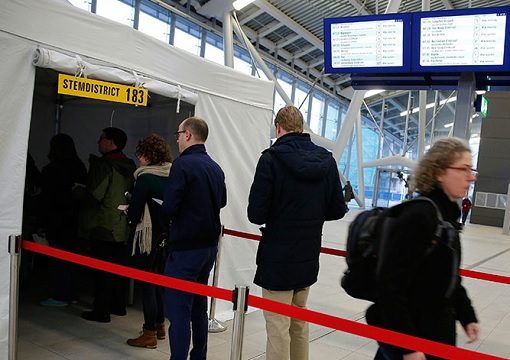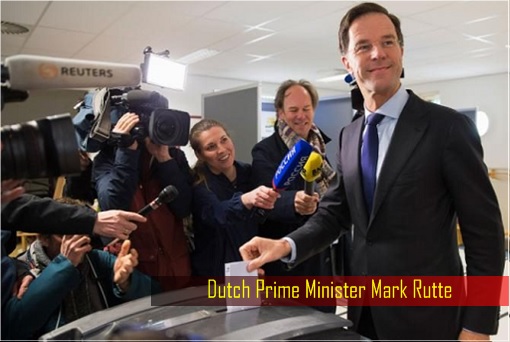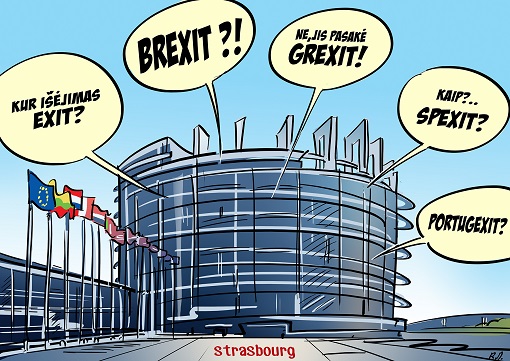With less than 3 months before British citizens decide in a referendum whether to leave the EU altogether, the Dutch has given those who support “Brexit” a boost. The Dutch voters have opposed and said “NO” to the European elite, well, sort of. Nope, they didn’t vote to quit EU but to reject a European Union free trade deal with Ukraine.
In total, 61.1% of Dutch voters opposed the deal, while just 38% supported it. Although the turnout was low at 32.2%, it was well above the required 30% threshold. The referendum was triggered by an internet petition begun by Eurosceptic activists that attracted some 450,000 signatures – in just 6 weeks.

Brexit, a shorthand way of referring to a possible British exit from the EU, is particular popular because many British citizens are unhappy with membership of the EU and that the bloc has transformed almost out of recognition since the UK joined in 1973. Brexit supporters say leaving would get rid of job-killing regulation and free Britain to decide its own laws and trading partners.
The influx of immigrants, especially the Syrian refugees, and the chaos they had created such as the massive Cologne attacks whereby dozens of women were molested, raped, assaulted and robbed has made more British (and other EU countries) citizens realized that putting their future in the hands of a few selected EU elite politicians could bring unimaginable disaster.

The referendum was the first in the Netherlands since the 2005 rejection of the EU constitution. Initially the Dutch government under Prime Minister Mark Rutte ignored the prospective referendum, partly in the hope that this would stop it from reaching the 30% threshold. Under the 2015 Dutch law on referendums, the result will be considered valid only if turnout is higher than 30%.
With the embarrassing “defeat”, Mark Rutte recognizes that his government may have to reconsider the treaty. Clearly, the Dutch referendum could act as an incentive to British voters to reject the EU on June 23. Anti-EU sentiment is rising across the region, including in founding bloc members such as the Netherlands, which has long been a strong supporter of European integration.

Although the result of the referendum is non-binding, Dutch law says that a “NO” vote, combined with a turnout of more than 30%, would mean the deal having to be discussed again by parliament. Prime Minister Mark Rutte, who is facing general elections next year, said he would no longer automatically proceed with ratification and would look for “a solution that is acceptable for all parties.”
Nigel Farage, who leads the anti-EU UKIP party, said a “No” vote would embolden those campaigning in the UK to leave the 28-member bloc. EU Commission President Jean-Claude Juncker has described the stakes in the run-up to the vote as being high, warning that a “No'” vote could trigger a wider crisis in the 28-member bloc.

The Dutch “NO” vote also represents a victory for Russia, which has long sought to derail the Ukraine pact. Although Ukrainian foreign ministry said the Dutch referendum is “advisory in nature” and has no huge impact whatsoever, EU officials acknowledge that they are heading towards a period of political uncertainty.
Other Articles That May Interest You …
- Panama Papers – The Secrets Of Dirty Money – From King Salman To Lionel Messi
- 4 Reasons Russia Intervened In Syria & Why Putin May Attack NATO As Well
- Already Panicking Over 1,000 “Rapefugees”? It’s Just The Beginning
- Germany Under Attack – Molest, Rape, Sexually Assault By 1,000+ Arab Mobs
- ISIS Have Passport Printing Machine – They May Have Entered U.S. Already
- Greeks Pride – Can’t Pay, Won’t Pay, Don’t Care To Pay
- What Can UMNO Do If The Kingdom Of Johor Declares Independence?
- Forget About Oil Crisis, Here’s New US$57 Trillion Global Debt Crisis
- Free Scottish From British – Will We See A New Country This Month?

|
|
April 7th, 2016 by financetwitter
|


|

|

|

|

|

|




























Comments
Add your comment now.
Leave a Reply